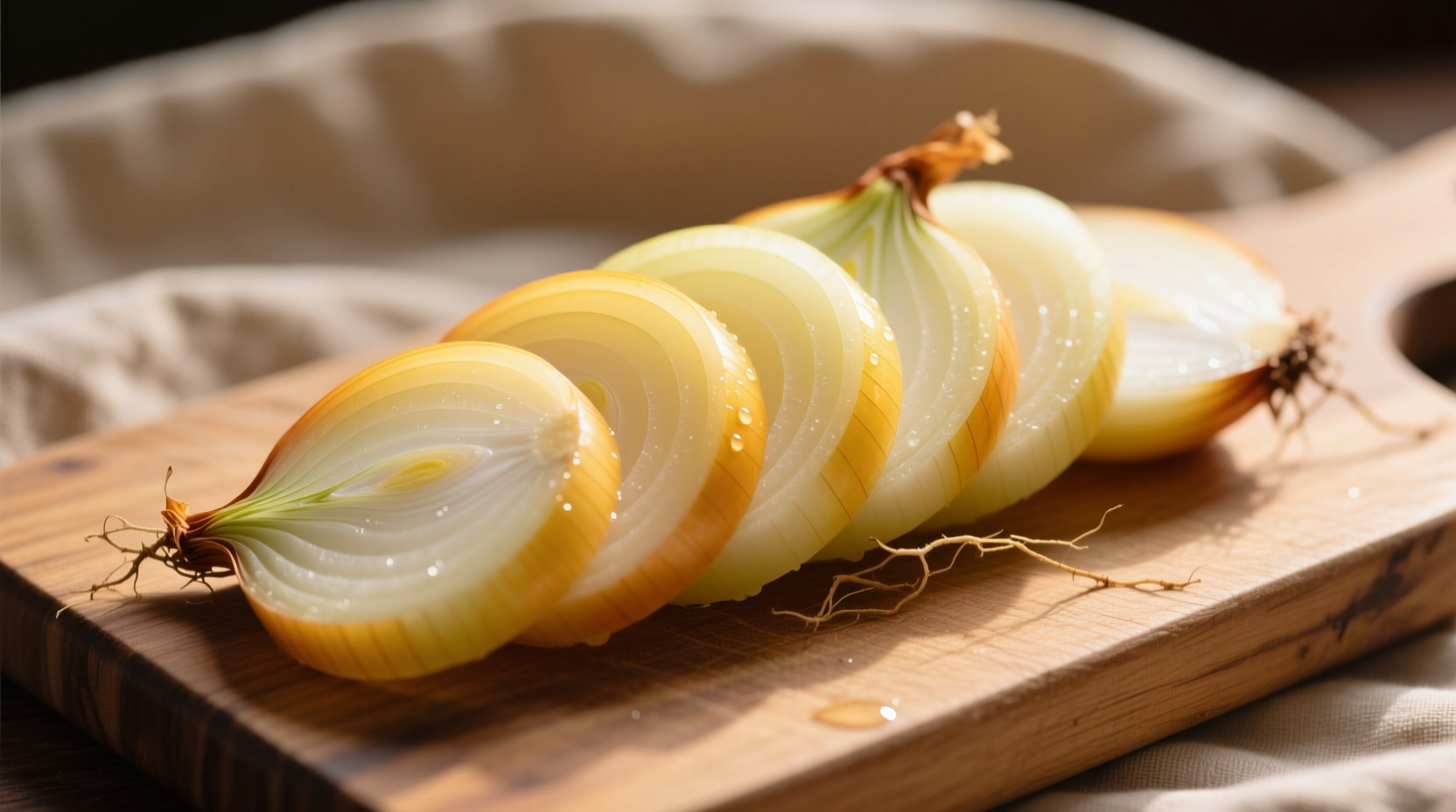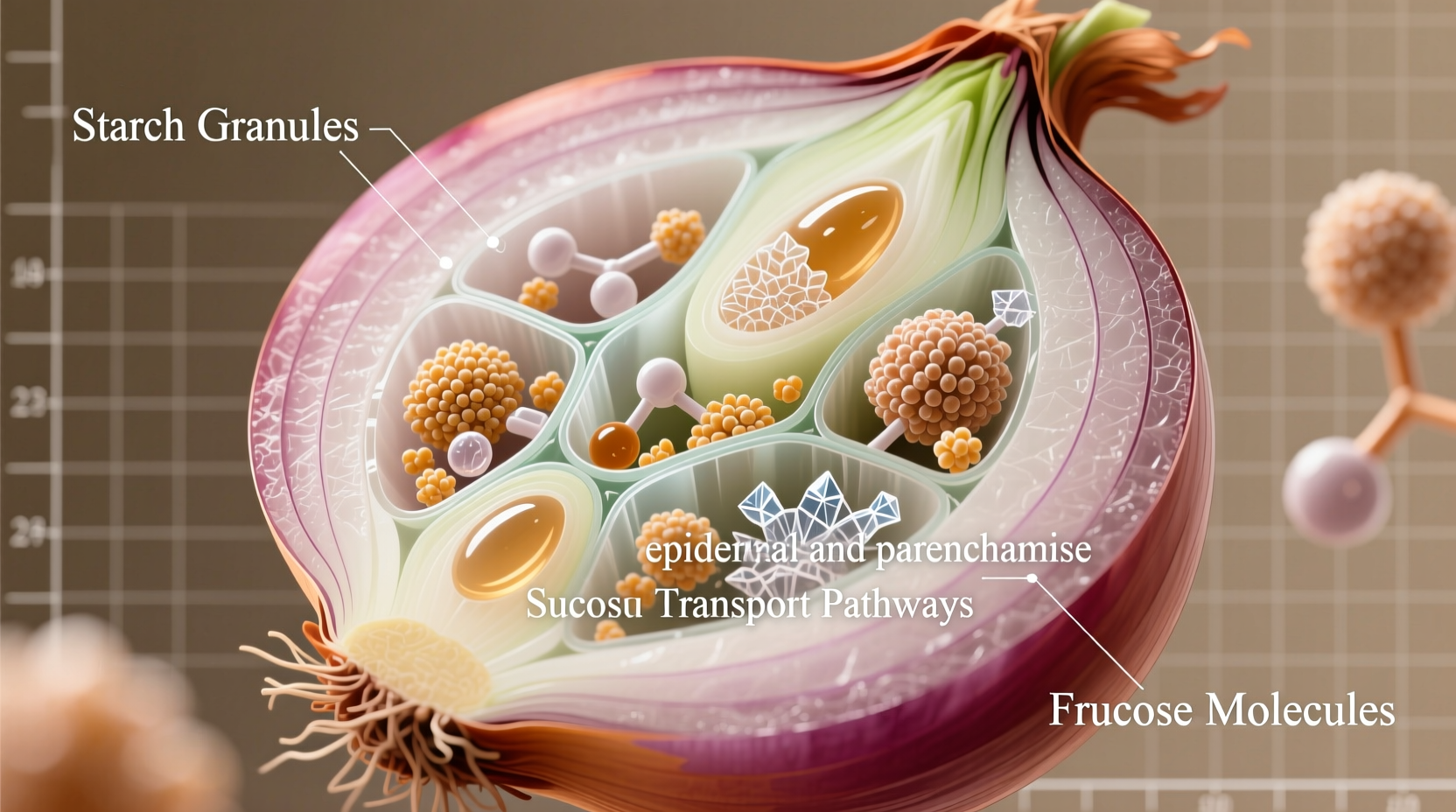One medium raw onion (110g) contains approximately 9 grams of total carbohydrates, with 7 grams of net carbs and 2 grams of dietary fiber. Yellow onions have slightly higher carb content than red or white varieties, making them important to consider for low-carb and diabetic diets.
Understanding the precise carbohydrate composition of onions helps home cooks and health-conscious eaters make informed dietary choices. Whether you're following a keto meal plan, managing blood sugar levels, or simply tracking your nutrition, knowing exactly what's in this kitchen staple matters.
Breaking Down Onion Carbohydrates
Onions contain three primary carbohydrate components that affect how they impact your diet. The USDA FoodData Central database provides the most reliable nutritional information for raw onions, showing exactly how these carbohydrates break down per 100 grams:
| Carb Type | Amount per 100g | Function in Body |
|---|---|---|
| Total Carbohydrates | 9.34g | Primary energy source |
| Dietary Fiber | 1.7g | Aids digestion, doesn't raise blood sugar |
| Sugars | 4.24g | Provides quick energy, affects blood glucose |
| Net Carbs | 7.64g | Total carbs minus fiber (impacts blood sugar) |
This nutritional profile explains why onions register at 11 on the glycemic index scale—considered very low. The fiber content helps moderate the blood sugar response, making onions more diabetes-friendly than many other vegetables.

Carb Content Across Onion Varieties
Not all onions contain identical carbohydrate levels. The specific variety affects both flavor profile and nutritional composition. Here's how common onion types compare based on USDA verified data:
| Onion Type | Total Carbs (per 100g) | Net Carbs (per 100g) | Best For |
|---|---|---|---|
| Yellow Onion | 9.34g | 7.64g | Caramelizing, roasting, general cooking |
| Red Onion | 8.97g | 7.35g | Salads, pickling, raw applications |
| White Onion | 9.05g | 7.42g | Mexican cuisine, salsas, grilling |
| Sweet Onion (Vidalia) | 7.86g | 6.45g | Raw consumption, sandwiches, mild dishes |
| Green Onions | 4.97g | 4.08g | Garnishes, Asian cuisine, low-carb diets |
When tracking carbohydrates for medical or dietary reasons, these differences become significant. For example, someone following a strict ketogenic diet limiting net carbs to 20g daily would need to account for nearly 40% of their allowance with just one medium yellow onion.
Practical Serving Size Considerations
Understanding how portion sizes translate to actual carb intake helps with meal planning. Here's how common onion measurements convert to carbohydrate content:
- 1 cup chopped raw onion (160g): 14.9g total carbs, 12.2g net carbs
- 1 small onion (50g): 4.7g total carbs, 3.8g net carbs
- 1 medium onion (110g): 10.3g total carbs, 8.4g net carbs
- 1 large onion (180g): 16.8g total carbs, 13.8g net carbs
- 1 tablespoon minced onion (10g): 0.9g total carbs, 0.8g net carbs
These measurements come directly from the USDA National Nutrient Database for Standard Reference, the most authoritative source for nutritional information in the United States. When precision matters for health management, weighing your onions provides more accurate carb counting than volume measurements.
How Cooking Methods Affect Carb Content
Preparation techniques significantly impact the final carbohydrate profile of onions in your dish. Understanding these changes helps with accurate nutritional tracking:
Raw onions maintain their complete nutritional profile, but cooking concentrates carbohydrates as water evaporates. When caramelizing onions, approximately 80% of the water content reduces, effectively doubling the carb density per volume. For example, 1 cup of raw chopped onions (14.9g total carbs) becomes about ¼ cup caramelized onions with the same carbohydrate content.
Certain cooking methods create new compounds that affect how your body processes these carbohydrates. The Maillard reaction during caramelization produces complex sugars that digest more slowly than the simple sugars in raw onions, potentially moderating blood sugar response despite the concentrated carbs.
For those managing carbohydrate intake, these context boundaries matter significantly. A tablespoon of caramelized onions contains nearly the same net carbs as a quarter cup of raw onions, which many people wouldn't consider equivalent when portioning dishes.
Onions in Specialized Diets
Understanding onion carbohydrates becomes crucial when following specific dietary patterns:
Keto Diet Considerations
Most keto guidelines recommend staying under 20-25g of net carbs daily. With 7.6g net carbs per 100g, yellow onions require careful portion control. Many keto cooks substitute shallots (6.3g net carbs per 100g) or scallions (4.1g net carbs per 100g) for lower carb alternatives while maintaining similar flavor profiles.
Diabetes Management
Despite containing carbohydrates, onions have a minimal impact on blood sugar due to their low glycemic load of 1.6 per medium onion. The American Diabetes Association recognizes onions as a non-starchy vegetable that can be consumed freely by most people managing diabetes. The chromium content in onions may actually improve insulin sensitivity according to research published in the Journal of Nutrition and Metabolism.
Weight Management
With only 40 calories per 100g and high water content, onions provide volume and flavor with minimal caloric impact. The fiber content promotes satiety, making them valuable for weight management despite their carbohydrate content.
Comparing Onions to Other Common Vegetables
Placing onion carbohydrates in context with other vegetables helps make informed dietary choices:
| Vegetable (per 100g) | Total Carbs | Net Carbs | Fiber |
|---|---|---|---|
| Onion (yellow) | 9.34g | 7.64g | 1.7g |
| Carrots | 9.58g | 7.98g | 2.8g |
| Broccoli | 7.18g | 4.04g | 2.6g |
| Spinach (raw) | 3.63g | 1.43g | 2.2g |
| Avocado | 8.53g | 1.83g | 6.7g |
| Zucchini | 3.11g | 2.11g | 1.0g |
This comparison shows that while onions contain moderate carbohydrates, they fall between higher-carb vegetables like carrots and lower-carb options like leafy greens. Their unique flavor profile often makes them worth the carbohydrate investment in meal planning.
Practical Tips for Managing Onion Carbohydrates
When incorporating onions into your diet while monitoring carb intake, consider these evidence-based strategies:
- Use kitchen scales for precise measurement rather than estimating by volume
- Substitute green onions for yellow onions in recipes to reduce carb content by nearly 50%
- When caramelizing, account for the reduced volume and concentrated carbs
- Pair onions with high-fiber vegetables to moderate blood sugar response
- For raw applications, choose red onions which have slightly lower net carbs than yellow varieties
- Consider using onion powder sparingly (1 tsp contains about 3g net carbs)
Remember that individual responses to carbohydrates vary. People with diabetes should monitor their personal blood glucose response to onions, as some may experience more significant impacts than others despite the generally low glycemic load.











 浙公网安备
33010002000092号
浙公网安备
33010002000092号 浙B2-20120091-4
浙B2-20120091-4